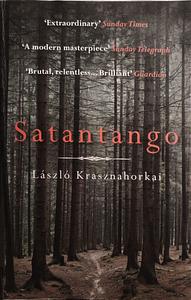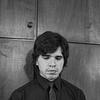Take a photo of a barcode or cover
challenging
dark
funny
reflective
Flaws of characters a main focus:
Yes
challenging
dark
funny
mysterious
reflective
tense
medium-paced
Plot or Character Driven:
Character
Strong character development:
Complicated
Loveable characters:
No
Diverse cast of characters:
Yes
Flaws of characters a main focus:
Yes
Now is time to confront the absurdly long adaptation film of Béla Tarr
this book does, like all of my favourites, contain the mark of the devil. deliciously evil, hopelessly malevolent and malignantly striking. it gets under your skin; it saturates your soul with disease and rot and doesn’t give you even a second to resurface and gain composure. it’s helpless and utterly relentless. but, that’s what i adored most. there is no use in attempting to write a book like this and not committing fully to the misery that you want to strike into the heart of. i have been unable to think of nothing else since the first page, and i certainly won’t ever stop talking about this monumental piece of literature now that it’s over.
satantango is a masterpiece of nihilism, and the hope that can stem from the absurd events that unfold unexpectedly within the seemingly relentless fact of existence. it’s all in the art of noticing, and creating your own reality.
krasznahorkai uses beautifully eloquent sentences, metaphors and hypnotic language to lure the reader into the full-fledged misery of the world that he has created. a failed communist utopia; the falling apart of the inner workings of existence and the abandonment of god— what does it all amount to? finding solace and the essence of what it means to be alive in the burning embers of a failed society seems an impossible task, until you begin to find yourself enticed by the irrational nature of a day-to-day life. the author is extremely fluent in the horrors of existence; topics such as atheism, sexuality, and capitalism rear their heads and serve as a background for the characters to come alive against. there are glimpses of their past in the way which they think, and it’s possible to understand their outlook on life just by comparing their actions to, perhaps, what we ourselves would do. when faced with the mundanity of life, and the hopeless knowledge that we are not the sole masters of our reality, perhaps we should turn to recognise the insane fact that we are all, indeed, alive. it’s all meaningless, yet that is what makes it so beautiful.
read it. read it. read it. you won’t regret even a second of the time you spend amidst it’s bleak pages.
challenging
dark
mysterious
slow-paced
Plot or Character Driven:
Character
Strong character development:
No
Loveable characters:
No
Diverse cast of characters:
Complicated
Flaws of characters a main focus:
Yes
A Faustian tale, an augury of annihilation, the normality of evil, a spiritual successor to Dostoevsky's DEMONS. Hard to believe this is Krasznahorkai's debut novel—it already feels like a fully-realized masterpiece from a writer long in years!
I love Tarr's adaptation, so it's interesting to see how the novel and film (co-written with Krasznahorkai) are practically 1:1 imaginings of the same story, just under different mediums. Though, Tarr's ending hits harder, I feel.
Estike's segment is just as disconcerting to read as it is to see onscreen. Yet, I think her tragedy as this poor, neglected simpleton and lost lamb resonated with me much more strongly here; asking if it's better to be a fool or learned creature in an indifferent, cruel world.
I love Tarr's adaptation, so it's interesting to see how the novel and film (co-written with Krasznahorkai) are practically 1:1 imaginings of the same story, just under different mediums. Though, Tarr's ending hits harder, I feel.
Estike's segment is just as disconcerting to read as it is to see onscreen. Yet, I think her tragedy as this poor, neglected simpleton and lost lamb resonated with me much more strongly here; asking if it's better to be a fool or learned creature in an indifferent, cruel world.
Denne gangen hang jeg meg mest av alt opp i hvordan Kraszhnahorkai skriver frem meningstapet som en uunngåelig følge av et rent materielt syn på verden, der selv møtene med åpenbare mirakler blir (bort)forklart i rasjonelle termer. Når menneskene mister sin gud og fornektes av sine ledere (ellevte kapittel er en lang og komisk beskrivelse av et system som ikke lenger har plass til, eller kontakt med, menneskene systemet i utgangspunktet var til for), må de finne mening på et annet vis, men hvor? Svaret ligger kanskje i romankonstruksjonen, der avsløringen på de siste sidene gir et helt nytt perspektiv på tekstens opprinnelse. Bare det som blir formulert, kan skje.
slow-paced
I love the way it's written because you have no idea what's going to happen next. It's like you have to continue reading to get any kind of context about the chapter and the characters. It doesn't just throw any kind of setup at you. some of the things are still very vague and never got cleared up. The ending was a twist and I liked it.
Het leven is een hel. En de hel dat zijn de anderen. Al helpt het landschap en het weer ook wel in dit boek. Het thema klinkt wellicht niet zo origineel maar zoals het uitgewerkt is, zeker wel. In een regenachtig en koud oosteuropa zit een groep mensen vast in oude gewoontes en op een vergane fabriek. Ze dromen van vertrek, maar dat komt er pas van als een onbetrouwbaar sujet, die zij als de verlosser zien, hen naar verschillende plekken buiten de fabriek stuurt. Dan is er heel wat drank vergoten, ook bij de dokter, die dit hele verhaal verzonnen heeft. Of toch niet?





